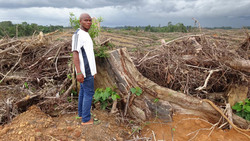Enough is too much: The growing case for investors to drop Golden Agri-Resources (commentary)
by Jeff Conant and Gaurav Madan
- Last year, when we published the report High Risk in the Rainforest, it was far from the first time that palm oil company Golden-Agri Resources (GAR) and its subsidiary Golden Veroleum Liberia (GVL) were called out for illegal deforestation, land grabbing, and the destruction of critical wildlife habitats. Our report, which detailed the clearance of dense forests and chimpanzee habitats, came several years into the companies’ serial destruction.
- Over a year later, both companies find themselves embroiled in controversies — and GAR’s investors continue to expose themselves and their beneficiaries to significant risks.
- The time has come for GAR’s financiers to acknowledge that, despite their engagement, things have gotten worse. If they understand the real material risks of their investments — risks both to forests and to their bottom-line — they need to engage much more aggressively to make GAR change its course. If they can’t do that, they need to get GAR, and companies like it, out of their portfolios.
- This post is a commentary. The views expressed are those of the author, not necessarily Mongabay.
Last year, when we published the report High Risk in the Rainforest, it was far from the first time that palm oil company Golden-Agri Resources (GAR) and its subsidiary Golden Veroleum Liberia (GVL) were called out for illegal deforestation, land grabbing, and the destruction of critical wildlife habitats. Our report, which detailed the clearance of dense forests and chimpanzee habitats, came several years into the companies’ serial destruction.
Over a year later, both companies find themselves embroiled in controversies — and GAR’s investors continue to expose themselves and their beneficiaries to significant risks.
Following the release of our report, we contacted GAR’s investors to spur them into action. We shared additional incriminating evidence from Global Witness and Forest Peoples Programme, as well as the Roundtable on Sustainable Palm Oil’s censure of GAR and GVL. And earlier this year, information we provided helped persuade the Dow Jones Sustainability Index to remove GAR from its Asia-Pacific listings.
But a year-and-a-half since that report, and many ongoing abuses later, things on the ground don’t look much better.
After stalling for months, in responding to our findings that GVL had illegally destroyed hundreds of hectares of Liberian rainforest, the company admitted that it had indeed cleared High-Carbon Stock forests in direct contravention of its own policies as well as international norms. Liberia is home to over half of the remaining Upper Guinea forest — known as “the lungs of West Africa” — and GVL’s operations include lands that are habitat for endangered populations of chimpanzees and pygmy hippos, among other endemic species. The destruction of these globally significant forests was severe enough — and the attention from civil society and investors sharp enough — to prompt GVL to halt its operations in Sinoe County, Liberia.
In Indonesia, an investigation last month revealed that GAR has been sourcing palm oil from an illegal plantation inside a high-priority conservation area and critical habitat known as “the orangutan capital of the world.” GAR supplies some of the largest brands in the world, including Unilever, Nestle, PepsiCo, Mondelez International, General Mills, Kellogg’s, Mars, and the Hershey Co. For these household consumer brands, supplying from GAR means violating their promises to not deal in conflict palm oil.
If that weren’t bad enough, earlier this year, three executives from Sinar Mas, one of GAR’s major subsidiaries, were convicted of bribery and sentenced to prison by an Indonesian court. Sinar Mas has also set fire to a forest larger than Singapore without facing consequences from investors or governments.
These ongoing abuses come at a time when the world is waking up to the destruction wrought on forests across the planet by industrial agriculture. From the Amazon to Indonesia, deforestation driven by the expansion of soy, cattle, and palm oil is one of the largest causes of climate change. Yet Wall Street investors like BlackRock, Vanguard, and Dimensional Fund Advisors continue to ignore the problem and to finance GAR’s environmental destruction. Similarly, the London Stock Exchange continues to list GAR on its ethical investment index.
In Liberia, some of the largest palm oil companies, including Sime Darby and Equatorial Palm Oil, are closing shop and planning to exit the country, as industrial plantations prove to be a poor investment. Malaysian palm oil giant Sime Darby reported some $16 million in losses in 2018.
Since receiving our 2018 report, at least half a dozen institutional investors have engaged with GAR, including voting against company management. Even BlackRock, the company with more money in deforestation than any other, named GAR among the companies it engaged in 2019. But given GAR’s continued track record — arrests for bribery, fires in Indonesia, and illicit clearance of forests in Liberia — it is tough to see how these engagements have made a difference.
Enough is too much, already. The time has come for GAR’s financiers to acknowledge that, despite their engagement, things have gotten worse. If they understand the real material risks of their investments — risks both to forests and to their bottom-line — they need to engage much more aggressively to make GAR change its course. If they can’t do that, they need to get GAR, and companies like it, out of their portfolios.
Jeff Conant is Senior International Forests Program Manager with Friends of the Earth US. Gaurav Madan is Senior Forests and Lands Campaigner with Friends of the Earth US.












